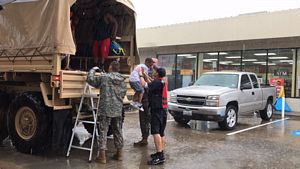|
By accessing or using The Crittenden Automotive Library™/CarsAndRacingStuff.com, you signify your agreement with the Terms of Use on our Legal Information page. Our Privacy Policy is also available there. |

Hurricane Harvey Boosts Gasoline Prices, Applications for Government Assistance
|
|---|
|
|
Hurricane Harvey Boosts Gasoline Prices, Applications for Government Assistance
Jim Randle, VOA News
Last Updated: 28 August 2017 (4:49PM)
 Trestian Woodard, 7, finds welcoming arms at a gas station doubling as a rescue transfer point in north Houston, Aug. 27, 2017. National Guard and Aldine Fire & Rescue members collected people from the Greenbriar Colony neighborhood. (C. Mendoza/VOA) Trestian Woodard, 7, finds welcoming arms at a gas station doubling as a rescue transfer point in north Houston, Aug. 27, 2017. National Guard and Aldine Fire & Rescue members collected people from the Greenbriar Colony neighborhood. (C. Mendoza/VOA)
|
U.S. gasoline prices surged as much as 7 percent Monday as a result of storm damage caused by Hurricane Harvey in Texas. Oil producers' costs also have been rising since the storm's winds and floodwaters slammed into a part of Texas that is home to much of the nation's oil industry, particularly oil refineries, shipping and production facilities.
Some experts estimate that U.S. gasoline prices could eventually rise six and a half cents a liter (25 cents a gallon). Crude oil future prices fell because refinery closures are expected to hurt demand for crude.
The port of Houston, the busiest shipping terminal in the United States in terms of foreign tonnage and the second-largest port overall, is closed at least through Tuesday.
Cornell University economist Steven Kyle says it is likely that a significant portion of the nation's oil infrastructure will be out of action "for a while." Kyle says it is too early to calculate exactly how much damage the storm has done, but it is clear there has been "huge destruction of capital assets," such as houses, roads and office buildings.
Kyle says normal economic measures like GDP don't capture the impact of disasters because they don't measure the loss of assets, but do count the rebuilding process as a burst of economic activity.
Some insurance experts say damage to homes and other structures could run into the billions of dollars after winds up to 200 kilometers per hour battered parts of southeastern Texas and pelted the area with a year's normal rainfall in just a few days, causing widespread flooding.
More than six million people live in or near Houston, the biggest city in the storm's path and the fourth largest by population in the United States. Many people fled before the storm; thousands have since been rescued, and tens of thousands are leaving flooded homes for emergency shelters. The Federal Emergency Management Agency says 450,000 people are expected to seek government financial assistance because of the disaster.
Government computer experts warn that criminals often craft fraudulent messages designed to dishonestly collect money for bogus hurricane charities, or gather credit card and other information for identity theft. The U.S. National Cyber Awareness System urges people to be careful of email attachments and to check charities with a database run by the Better Business Bureau.
The U.S. Federal Reserve said banks should try to work out accommodations with businesses and others that are having difficulty repaying loans because of the storm. The Fed said efforts to work with "borrowers under stress" can be consistent with "safe-and-sound" banking practices and the public interest.

















